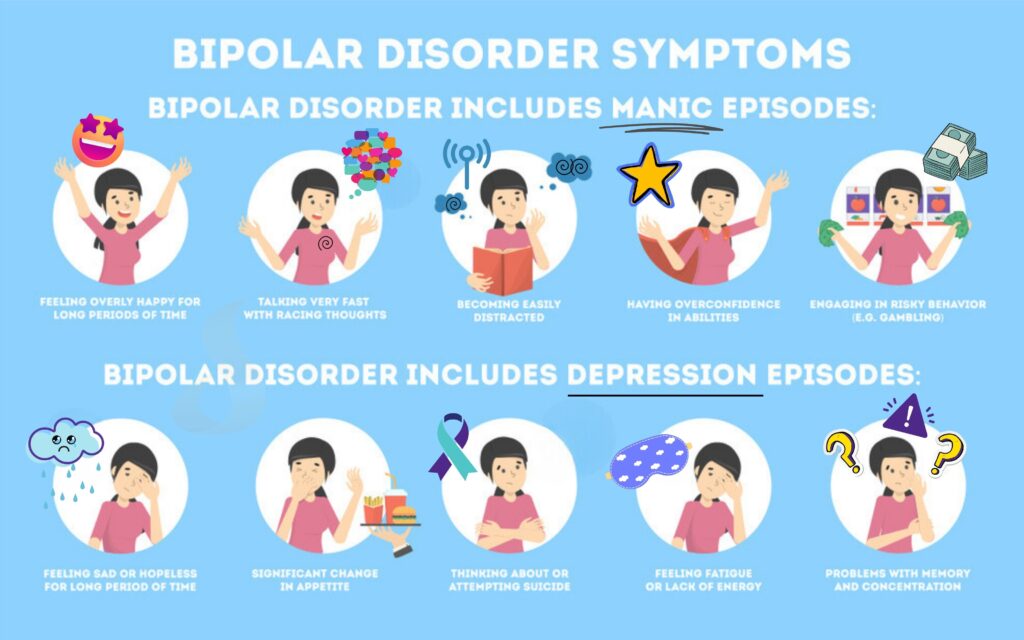What's On This Page?
ToggleToday I’ll showcase some information about bipolar disorder and a new study that reveals how D3 and zinc help out! As a passionate advocate for integrating conventional and alternative medicine, I’m always on the lookout for promising research that bridges the gap between these worlds.
We’re going to delve into a recent study that examines the role of Vitamin D3 and Zinc in enhancing the effectiveness of traditional bipolar disorder treatments, such as lithium and olanzapine (Zyprexa®). A recent study could mark a significant shift in how we approach mental health treatment, focusing on a holistic strategy that includes vitamins and minerals.
Understanding the Bipolar Study’s Foundations
Bipolar disorder affects approximately 5.7 million adult Americans or about 2.6% of the U.S. population.The recent study published in the April 2024 issue of Nutritional Neuroscience has shed light on how integrating vitamin D3 and zinc into the treatment regimen can potentially enhance the antimanic effects of lithium and olanzapine. The researchers induced mania in a controlled animal model and tested various combinations of these supplements with standard medications.
Breakthrough Findings
The study’s outcomes are compelling to say the least. They indicate that Vitamin D3 and Zinc, when used in conjunction with lithium and olanzapine, not only augment the therapeutic effects but also seem to mitigate some adverse side effects associated with these drugs! The different combinations tested showed significant improvement in managing behavioral and pathological changes during the study suggesting this synergy would carry through to people.

Symptoms Change
When someone is experiencing a manic episode, the signs can be profound and varied, showcasing a spectrum of emotional, cognitive, and behavioral changes. These episodes often feature an overwhelming sense of happiness, hopefulness, and excitement. Yet, this heightened euphoria can swiftly pivot to intense feelings of irritability or anger, marking a dramatic shift in mood. Individuals may exhibit restlessness paired with rapid speech and a flood of racing thoughts, making conversations and focus difficult.
Sound sensitivity has been recognized in bipolar disorder (as well as PTSD, OCD, autism and Tourette syndrome) and whether it is hyperacussis or full-blown misophonia, it becomes apparent to the sufferer. You can read more about those conditions in my other blog post, When Noise Triggers Rage: Exploring Misophonia.
Energy levels typically surge during a manic episode, reducing the need for sleep, while impulsivity takes center stage, sometimes leading to life-altering decisions like impulsively quitting a job. Plans during this time can be grandiose and unachievable, often far removed from reality. Risk-taking behaviors become more apparent, including recklessness like substance misuse or engaging in unsafe behaviors.
In the more severe cases of mania, a person might feel an inflated sense of self-importance or believe they have exceptional talents or powers. The most extreme manic episodes can also lead to psychosis, where the person might experience hallucinations or delusions. These are some of the hallmark symptoms that signal a manic episode is taking place, reflecting a significant shift from typical behavior that necessitates careful intervention.

The Role of Vitamin D3 and Zinc in Neurological Health
Vitamin D3, often low in people with bipolar disorder, is essential for brain health and mood stabilization. A lot of people don’t realize that because we think of vitamin D for cold/flu season, or for its role in autoimmune disorders. Consider reading, 20 Unusual Signs of Vitamin D Deficiency.
The antioxidant mineral zinc, most famous for its role in thyroid health, prostate function, skin/beauty, and wound-healing also appears to help in bipolar disorder. Zinc plays a crucial role in neurotransmitter function and overall brain health because it is GABAergic and mitigates glutamate – two very important things during a manic episode.
The study highlights how both of these nutrients enhance the response to medications, potentially allowing for lower doses. The beauty of that means reduced risk of side effects because side effects are often dose-dependent.
I want to spotlight what each of these nutrients can do in the human body, and show you why the study results were so positive: Let’s start with zinc first:
Zinc’s Role in Reducing Manic Symptoms
Zinc isn’t just a trace mineral on the back of your supplement bottle; it’s a powerhouse in brain health that has a significant role in managing mood and possibly mitigating symptoms of mania in bipolar disorder. As a provider of zinc supplements, it’s important for me to say that while zinc supports brain health and mood, it is not a treatment, cure, or preventive measure for mania or bipolar disorder.

Here’s a closer look at how zinc gets involved:
1. Glutamate Regulation: Imagine glutamate as the brain’s main ignition switch—it fires up neural activity. Zinc helps modulate this excitatory neurotransmitter, gently tweaking its receptors to keep the brain’s activity levels balanced. This is crucial because too much stimulation in the brain contribute to the whirlwind of mania.
2. Boosting GABA: On the flip side, GABA is like the brain’s brake pedal. It slows things down, bringing calm to the neural highway.
Zinc enhances the function of GABA, supporting a calmer, more stable neural environment. This soothing influence is particularly important in bipolar disorder, where the brain might need help slowing down during manic highs. Zinc is GABAergic (pronounced GABA-ergic) – which means it increases GABA activity.
3. Dopamine Dynamics: Dopamine is the feel-good neurotransmitter, often linked with the brain’s reward circuit. While zinc doesn’t shake hands directly with dopamine, it influences the party – helping regulate how dopamine is made and how it behaves. This can be key in bipolar disorder, where dopamine might ‘dance like nobody’s watchin’ during manic episodes!
4. Norepinephrine Nuance: Zinc also touches on norepinephrine, a neurotransmitter that handles our fight or flight response. It subtly influences how norepinephrine is managed, which could be pivotal in smoothing out the mood swings associated with bipolar disorder. Consider reading my other article, 6 Surprising Reasons Drug Muggers Zap Zinc.
5. Serotonin Support: Lastly, while zinc isn’t directly making serotonin, it indirectly supports your brain’s overall mood, where serotonin plays a major role. Zinc supplementation has been seen to bolster the effectiveness of antidepressants, hinting at its supportive role in mood stabilization even before this study.
In essence, zinc helps stabilize the neurotransmitters that might go off-kilter during manic episodes in bipolar disorder. Integrating zinc into treatment strategies, along with prescribed mood-stabilizing drugs, could be a game-changer in terms of balancing brain chemistry. That said, see my cautions below.

Vitamin D3’s Role in Reducing Manic Symptoms
Let’s explore how Vitamin D3, often hailed as the “sunshine vitamin,” could play a vital role in managing manic symptoms associated with bipolar disorder. As a provider of Vitamin D3 supplements, I need to point out that while Vitamin D3 supports brain health and mood, it is not a treatment, cure, or preventive measure for mania or bipolar disorder.
1. Sunshine for the Soul: Vitamin D3 isn’t just good for your bones, it’s essential for your brain too. By interacting with areas of the brain responsible for mood regulation, vitamin D3 can shine a light on the darker corners of mood disorders. Ensuring adequate levels might help stabilize the mood swings that characterize bipolar disorder, particularly the highs of mania.*
2. Brain’s Protective Buddy: Vitamin D3 is like a bodyguard for your neurons. It helps protect your brain against a cocktail of stressors that can aggravate psychiatric conditions. Its neuroprotective properties ensure that brain cells are operating in a healthier environment, which can be crucial in reducing the severity of manic episodes.*
3. Calming the Inflammatory Storm: During manic phases, the brain can experience a sort of inflammatory storm. Vitamin D3 steps in as a ‘peacekeeper of sorts,’ helping to dial down the brain’s inflammatory response.* By keeping inflammatory cytokines in check, vitamin D3 calms the brain’s environment, reducing susceptibility to mania.*
4. Regulating the Messenger Traffic: Vitamin D3 helps regulate the release and function of neurotransmitters like dopamine and serotonin, both pivotal in mood regulation. By ensuring these chemical messengers are not in overdrive – common in manic episodes – vitamin D3 helps keep the emotional and psychological traffic flowing smoothly.*
5. Enhancing Cognitive Function: Clear thinking can often be a casualty in the chaos of mania. Vitamin D3 supports cognitive functions, helping improve focus and decision-making. This can be particularly beneficial during a manic episode, where thoughts may race and judgment may be clouded.*
6. Boosting Overall Brain Health: Beyond its direct impact on mood and cognition, Vitamin D3 supports overall brain health.* It assists in the growth and repair of brain cells, enhances the brain’s plasticity (its ability to adapt and change), and contributes to the long-term health of the central nervous system.*

Cautions: Strategy for Safety
This research opens the door to more personalized and effective treatment plans for bipolar disorder. By incorporating vitamin D3 and zinc, healthcare providers might improve treatment outcomes and the overall quality of life for patients. This approach underscores the importance of a comprehensive treatment strategy that addresses both the mental and physical aspects of health.
Vitamin D3 and Zinc are powerhouse supplements that support overall health but require mindful usage. Here’s what you need to know before integrating them into your regimen:
Vitamin D3
Overdosage Concerns: Too much Vitamin D can lead to HYPERCALCEMIA, with symptoms like nausea and kidney issues. Moderation is key.
Medication Interactions: Be cautious if you’re on steroids or heart/kidney medicines, as Vitamin D can affect their effectiveness.
Health Conditions: Those with conditions like sarcoidosis should consult their doctor, as higher Vitamin D levels might worsen symptoms.
Zinc
Excessive Intake Risks: High doses can cause nausea, immune dysfunction, and lower good cholesterol levels. Keep your intake balanced.
Drug Interactions: Zinc can impact the absorption and efficacy of certain antibiotics and rheumatoid arthritis medications. Zinc reduces absorption of thyroid medicine like levothyroxine (separate by 4+ hours).
Copper Absorption: High zinc levels can lead to copper deficiency, affecting nerve and immune health. You may want to read my other article, My 2 cents about Copper Worth a Million Bucks.
Always chat with a doctor before starting these supplements if you have pre-existing conditions or are on other meds. Another common sense item, please adhere to recommended doses or lower to start. I always suggest you start low and go slow to maximize benefits and minimize risks.
By keeping these pointers in mind, you can safely enjoy the benefits of Vitamin D3 and Zinc, ensuring they complement your health without complications. I have one more caution for you in my conclusion down below.
Summary
The findings from this study emphasize the need to respect holistic approaches for mental health, often flooded with heavy-duty pyschotropic drugs that serious and sometimes permanent have side effects. Many drugs for mental health concerns alter the cell’s receptor sites for life, making it difficult if not impossible to ever get off the medications.
Integrating nutraceuticals like Vitamin D3 and Zinc can complement traditional medications, potentially making them more effective and tolerable. This recent study underscores the potential benefits of a holistic approach to treating bipolar disorder. By blending conventional pharmacological treatments with nutritional supplements, we see a pathway toward enhanced patient outcomes.
As we explore into these possibilities, it’s becoming ever more apparent that America’s current approach to mental health must be as comprehensive and nuanced as the disorders we’re treating. I think including Vitamin D3 and Zinc in the medical plan for bipolar disorder would not only amplify the effects of traditional medications, but lessen their side effects. This integrative strategy promises to transform treatment plans, offering a more tailored and enriched quality of life for those navigating the complexities of this condition.
However, it’s crucial to remember that while supplements like Vitamin D3 and Zinc are accessible and beneficial for supporting overall health, bipolar disorder is a serious medical condition that requires professional healthcare guidance. Always consult with a healthcare provider before starting any new treatment regimen, especially when managing a condition as complex as bipolar disorder. This ensures your care is both safe and optimally tailored to your specific health needs. Together, with informed medical advice, we can explore these exciting new avenues safely and effectively.

Suzy Cohen, has been a licensed pharmacist for over 30 years and believes the best approach to chronic illness is a combination of natural medicine and conventional. She founded her own dietary supplement company specializing in custom-formulas, some of which have patents. With a special focus on functional medicine, thyroid health and drug nutrient depletion, Suzy is the author of several related books including Thyroid Healthy, Drug Muggers, Diabetes Without Drugs, and a nationally syndicated column.


